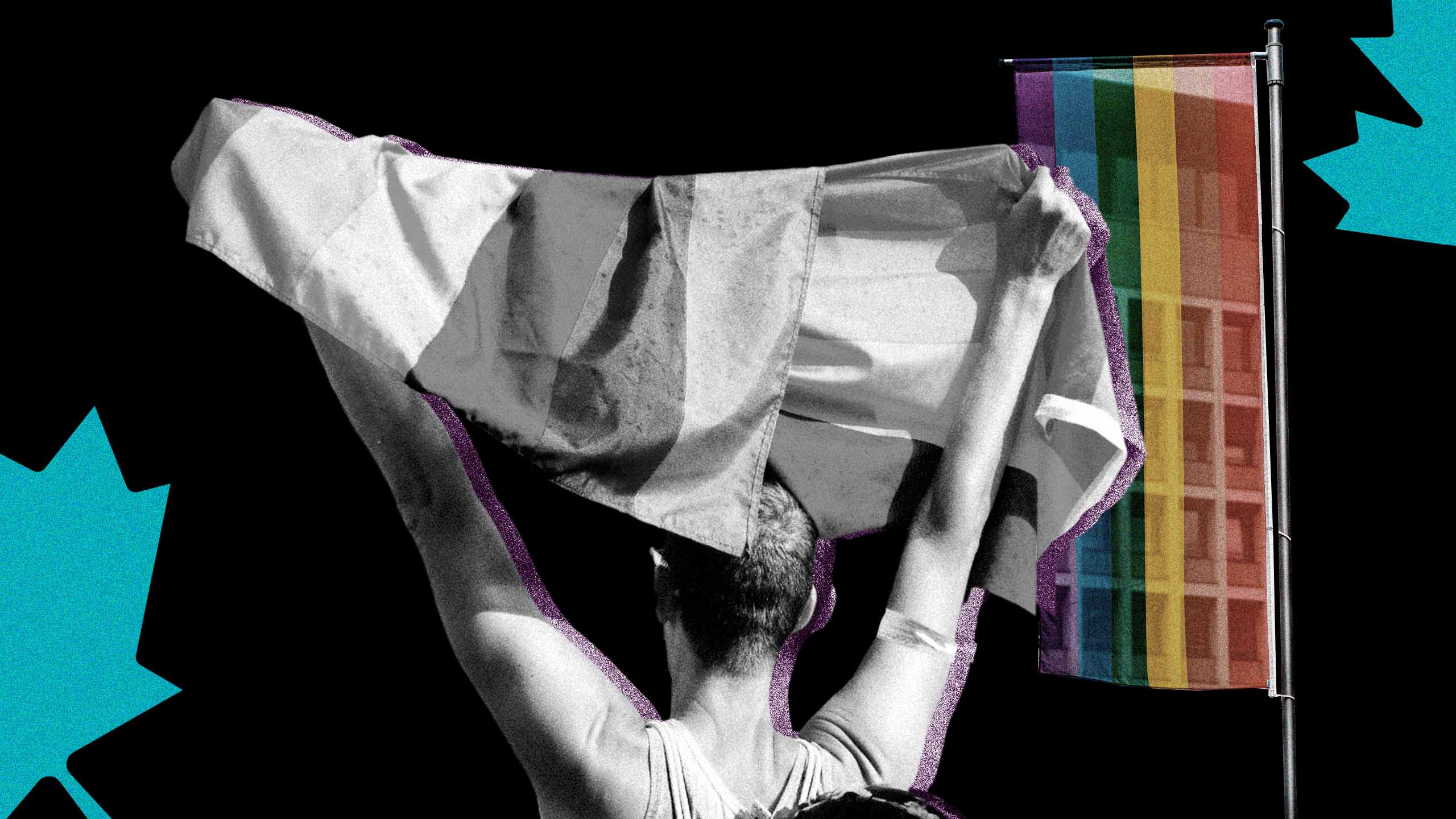Amid rising hate, queer and trans advocates across the country are highlighting the need to work together and reframe the narrative in the fight for LGBTQ2S+ rights. “We really have to have a united front, and we have to have these messages that are really, really clear and extremely tangible for people,” says Alex Ash, executive director of Chroma NB, a LGBTQ2S+ non-profit based in Saint John, New Brunswick.
While it’s been hard for queer and trans organizations to get ahead of the hate that right-wing media and anti-trans groups have been spewing, Ash says combating hate means shifting from a reactive stance to a proactive one. That starts with providing factual information and emphasizing what’s really at stake. “People have been pitted against one another, when actually, everyone wants the same thing—they want children to be safe,” they say.
Ash was one of hundreds of queer, trans and allied leaders across Canada who gathered in Ottawa in September for a conference to address rising homophobia and transphobia. Hosted by the Enchanté Network, a group that supports queer and trans organizations nationwide, the annual conference is the largest meeting of LGBTQ2S+ leaders in Canada.
Enchanté executive director Tyler Boyce said this year’s theme of combating anti-LGBTQ2S+ hate was inspired by a trend among member organizations. “We are experiencing hate crimes at an unprecedented level, and there is really no direction,” he says. Statistics Canada’s latest numbers show a 64 percent jump in police-reported hate crimes targeting sexual orientation from 2020 to 2021.
Boyce says the conference offered an opportunity for advocates to come together and form solutions for the current moment. “Queer and trans communities are mobilizing across the country to set our own agenda,” he says. “We’re not idly sitting by while anti-trans rhetoric runs rampant within our political sphere.”
Transphobic policies have festered in Canadian politics over the past few months. At the annual Conservative Party convention earlier in September, MPs approved a policy to ban gender-affirming care for youth as well as a wide-ranging anti-trans “bathroom bill.” Party leader Pierre Poilievre is not bound to implement the policies, and it has yet to be determined whether the Conservatives will try to introduce a bill on the subject. But advocates have already rung alarm bells about the danger this political stance poses to trans people.
The Conservative policy news came just weeks after Saskatchewan education minister Dustin Duncan announced that staff must seek parental consent when students under 16 want to change the name or pronouns they use at school. New Brunswick introduced a similar policy change in the spring.
During her keynote speech at the conference, Wisdom2Action executive director Fae Johnstone said it’s time LGBTQ2S+ groups started gearing up for a bigger kind of fight, the likes of which Canada hasn’t seen since the marriage equality movement about two decades ago. “What we’re seeing now, where the public is actually focused on equity, on us, on queer and trans people—we have not had that in a long while,” she said.
On Sept. 20, thousands of counter-protestors marched in cities across the country in support of trans- and queer-inclusive school policies. The demonstrations were organized to push back against the 1 Million March 4 Children, a nationwide series of events coordinated by right-wing groups to oppose educational resources such as sexual orientation and gender identity (SOGI) policies. Advocates have warned that these anti-trans protests are a harbinger of growing anti-trans hate.
For Johnstone, addressing anti-LGBTQ2S+ hate begins with queer and trans organizations acting strategically and proactively. “We cannot rely on ‘protect trans kids’ or ‘you’re a bigot’ to win this fight,” she said in her speech. “We cannot just accept their frame.” Instead, Johnstone emphasized that organizations need to focus on bringing people outside of queer and trans communities along with them. That means thinking like a political party—campaigning, door-knocking and coming together to push a singular message to the public. “Our job is actually to change hearts and minds,” said Johnstone.
“Anti-LGBTQ2S+ hate is very much a game about debating people’s existence, about debating people’s humanity,” they say. “When we don’t talk about the humans behind it and we keep trying to report on queer and trans issues while keeping it theoretical, we’re not going to get anywhere.”
The need for a shift in messaging was echoed by Montreal-based activist Celeste Trianon. She says she’s noticed major LGBTQ2S+ organizations adopting the rhetoric of the anti-trans movement, using terms created by TERFs such as “gender ideology” and “gender critical.” Advocacy groups should ensure that the language they use accurately reflects trans people’s realities, Trianon says.
“Anti-LGBTQ2S+ hate is very much a game about debating people’s existence, about debating people’s humanity,” they say. “When we don’t talk about the humans behind it and we keep trying to report on queer and trans issues while keeping it theoretical, we’re not going to get anywhere.”
Trianon says one of the foundations of the fight against anti-LGBTQ2S+ hate is reshaping the narrative around trans people. “We’re not monsters—we’re human beings,” she says. “Human beings who are deserving of full-fledged lives and full-blown participation in civil society, in business, in government and everywhere.” They see the media playing a role in advancing this message by centring trans youth and their parents in reporting about anti-trans policies, while telling stories about trans people that go beyond LGBTQ2S+ issues.
Debunking disinformation and hoaxes—such as the myth of schools introducing litter boxes for students—is also key to affirming LGBTQ2S+ people’s humanity, Trianon says. “I want to make sure everyone is equipped to tackle these upcoming years, which will likely be some of the most challenging for queer and trans people all across the globe, and here as well.”
Another theme highlighted by queer and trans leaders was the call for greater collaboration between LGBTQ2S+ organizations of all sizes. Melody Wood, board chair of OUTSaskatoon, said that in the weeks after Saskatchewan introduced its anti-trans pronoun and name policy in schools, many local groups felt “frozen.” The conference showed her the importance of coordinating with other Saskatchewan queer and trans groups to determine a provincial response. “There are just so many of us,” she says. “Finding out how we can bring our best voice and the best course of action to lend to the total Saskatchewan push will be important.”
Wood adds that OUTSaskatoon is hoping to expand their reach and support people of colour in rural communities, particularly Two-Spirit people. “There are lots of Two-Spirit kids way far north, who may have never even heard about Saskatoon or what it really means to be queer and Indigenous, and additionally, what it means to be Two-Spirit,” she says. Wood notes that journalists also need to put resources into building relationships with Two-Spirit communities. “As a Two-Spirit person, when organizations and institutions take the proper time to reach out to us and engage us properly, it feels so much more rewarding,” she says. “It captures a bigger, more whole picture.”
In the meantime, Alex Ash is working to transform hopes of increasing reach and promoting regional collaboration into action. They’re organizing a symposium for LGBTQ2S+ groups across the Atlantic provinces to pool resources, discuss service gaps and share best practices.
Ash says they see many shared values across the Maritimes, such as the rural nature of the provinces. “I think there’s something to be said for coming together as a group to think about how we could potentially mobilize as a region,” they say. Ash hopes the region could then approach government bodies and corporations for funding, and introduce a coordinator to oversee applications for larger grants.
Trianon says meeting right-wing backlash and combating LGBTQ2S+ hate shouldn’t rest on the shoulders of queer and trans individuals and organizations. While she says she’s received messages from people telling her that her work has made them feel safer, she says it shouldn’t be that way. “No one should feel safer owing to the actions of individual activists.… If they feel safer because I’m around, it means that they don’t feel safe because of something else—in this case, it’s anti-trans and anti-LGBTQ2S+ hate.”
Boyce echoes this sentiment. “This is an issue that affects all Canadians, from every single walk of life,” he says. He views the attack on LGBTQ2S+ people as an attack on fundamental human rights, and he says there are intersections between queer and trans movements and other communities’ fights for religious expression, housing and other freedoms.
But Boyce noted there’s a silver lining to the unprecedented hate we’ve seen. “The reason this backlash against our communities is happening is because we’ve come so far, and we’re standing so beautifully in the present moment,” he says. “This is an opportunity for us to tap back into that, to the collective power that allowed us to get to where we are today.”


 Why you can trust Xtra
Why you can trust Xtra


